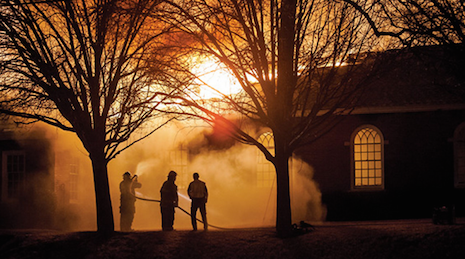“The only church that illuminates is a burning church.”
This quote by Spanish anarchist Buenaventura Durruti appears at the close of Little Hope Was Arson. It also appeared on posters for the film scattered throughout Park City, Utah, where Little Hope Was Arson screened as part of the 2014 Slamdance Film Festival. I attended a Q&A with producer Trenton Waterson and director Theo Love as part of the Windrider Forum that week, and was able to pick up one of those posters to take home with me. That quote has stayed with me ever since. There are so many layers of meaning packed into a quote like that, even more so when accompanied by a film with this subject matter. The filmmakers do a great job at challenging the audience to search for something illuminating and redeeming amidst the charred devastation of burned-down churches.
Little Hope Was Arson is a fascinating documentary which centers around a group of churches that were destroyed by arson throughout east Texas in 2010. Its title alludes to Little Hope Baptist Church, which was the first church to be destroyed and was initially not considered to have been caused by arson. The opening sequence showing all of the churches burning over the course of several weeks was chilling. Not surprisingly, the film documents the federal investigation into these church fires through news footage and interviews with law enforcement. However, an even more riveting story begins to unfold as the families and acquaintances of the two arsonists—Jason and Daniel—are interviewed. I won’t spoil too much about Jason and Daniel’s motives, but needless to say they had not been pleased with either the Church or God.
 Waterson and Love do a great job portraying the range of churchgoers’ and community members’ reactions to the arsonists. They are enraged, scared, hurt, and confused. Some are vengeful, expressing their disgust and delivering threats of what they wanted do to the individuals who were burning their churches down. Once the Jason and Daniel are caught, some of those people reached a place where they felt they could offer forgiveness, but others still struggle with that possibility. That tension remains throughout the rest of the film, but there are some remarkable examples of forgiveness along the way.
Waterson and Love do a great job portraying the range of churchgoers’ and community members’ reactions to the arsonists. They are enraged, scared, hurt, and confused. Some are vengeful, expressing their disgust and delivering threats of what they wanted do to the individuals who were burning their churches down. Once the Jason and Daniel are caught, some of those people reached a place where they felt they could offer forgiveness, but others still struggle with that possibility. That tension remains throughout the rest of the film, but there are some remarkable examples of forgiveness along the way.
One of the most powerful interviews was with James Ellis, Jason and Daniel’s former youth pastor. James recounted how he initially reacted when he heard about the church fires. He felt sorry for the people in the church whom he figured had caused the arsonists to be angry at God and the Church. Then, he suddenly realized that he had been that person, that he had been ignoring the two boys who had been burning the churches all along. His next words were the most powerful ones of the entire film: “Getting slapped in the face by your hypocrisy hurts like hell.”
This sobering conviction turned out to be an inspirational turning point in James’ life. Many of those interviewed commented on how a church is more than just a building but is instead made up of the people in it. However, James took this realization one step further. He felt that the most important aspect of the church is those outside of it. He decided to actually go out and be the church. Rather than build a church and wait for the “unchurched” to come to it, he went out into the world and look for them. James’ actions give new meaning to Durruti’s quote. Instead of letting the devastation of the burning churches impair him, James became an illuminating light in the world – which is exactly what the church is supposed to be.
Little Hope Was Arson is currently available on demand and is playing in select theaters across the country over the next few months.
You might alson find this review of Little Hope Was Arson helpful:

